CER238 Research Skills: Memory Retrieval Cues Investigation
VerifiedAdded on 2023/01/12
|12
|3279
|72
Report
AI Summary
This research report, focusing on the CER238 module, investigates the effect of retrieval cues on word recall. The study employed a quantitative approach, using experiments with 20 participants divided into cued recall and free recall conditions. The report includes an abstract, literature review, methodology, results (mean, median, mode), discussion, evaluation, and conclusion. The literature review explores the function of retrieval cues in accessing and bringing conscious awareness of memories, as well as factors impacting memory retrieval. The results indicate that participants in the cued recall condition recalled more words than those in the free recall condition. The discussion interprets these findings, referencing the literature review to highlight the significance of retrieval cues and the potential for improving memory. The study also acknowledges the limitations of memory retrieval problems such as missing thoughts, amnesia and strategies to improve memory. This report offers valuable insights into memory processes and the effectiveness of retrieval cues, contributing to the understanding of cognitive psychology. This assignment is contributed by a student to be published on the website Desklib, a platform which provides all the necessary AI based study tools for students.
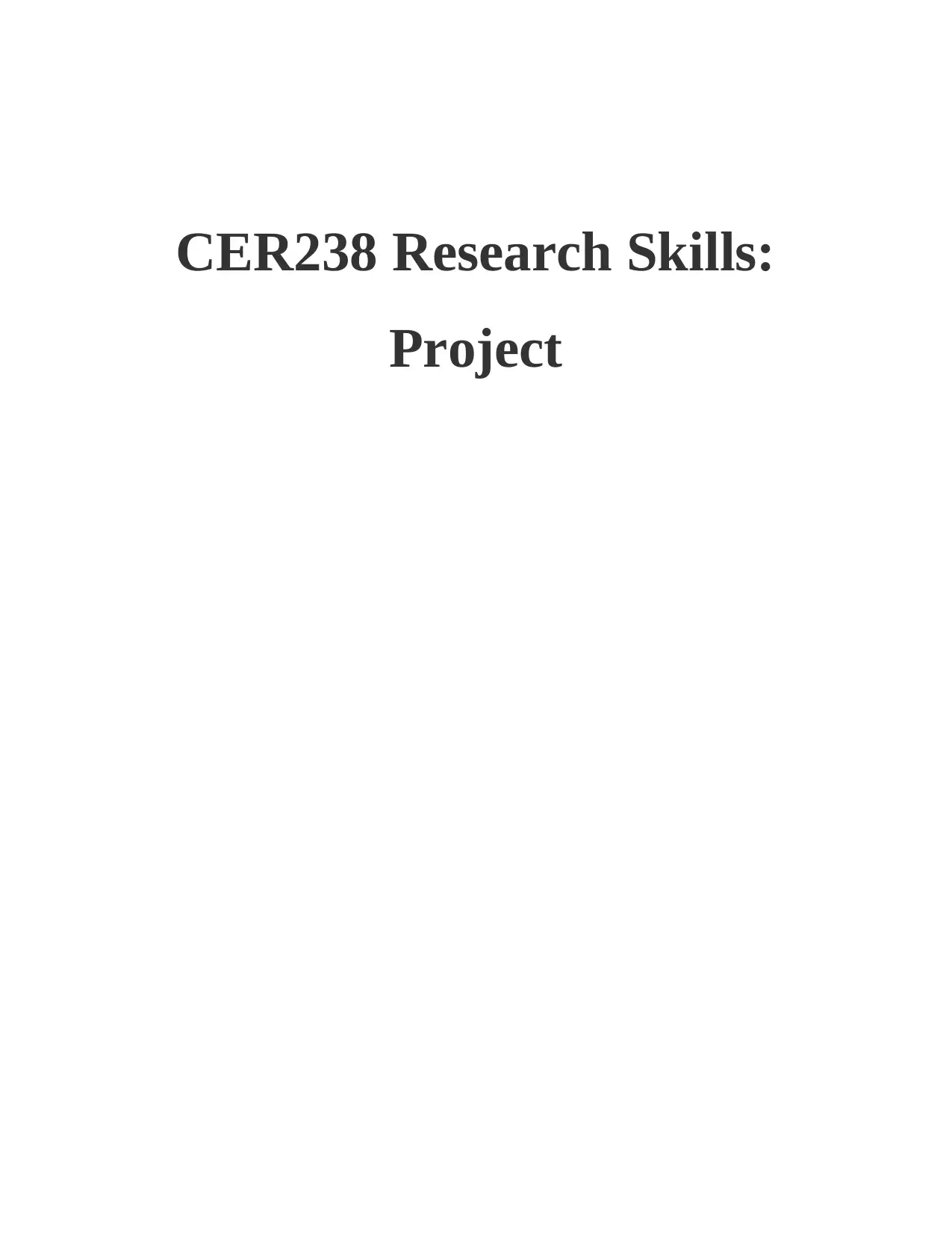
CER238 Research Skills:
Project
Project
Paraphrase This Document
Need a fresh take? Get an instant paraphrase of this document with our AI Paraphraser
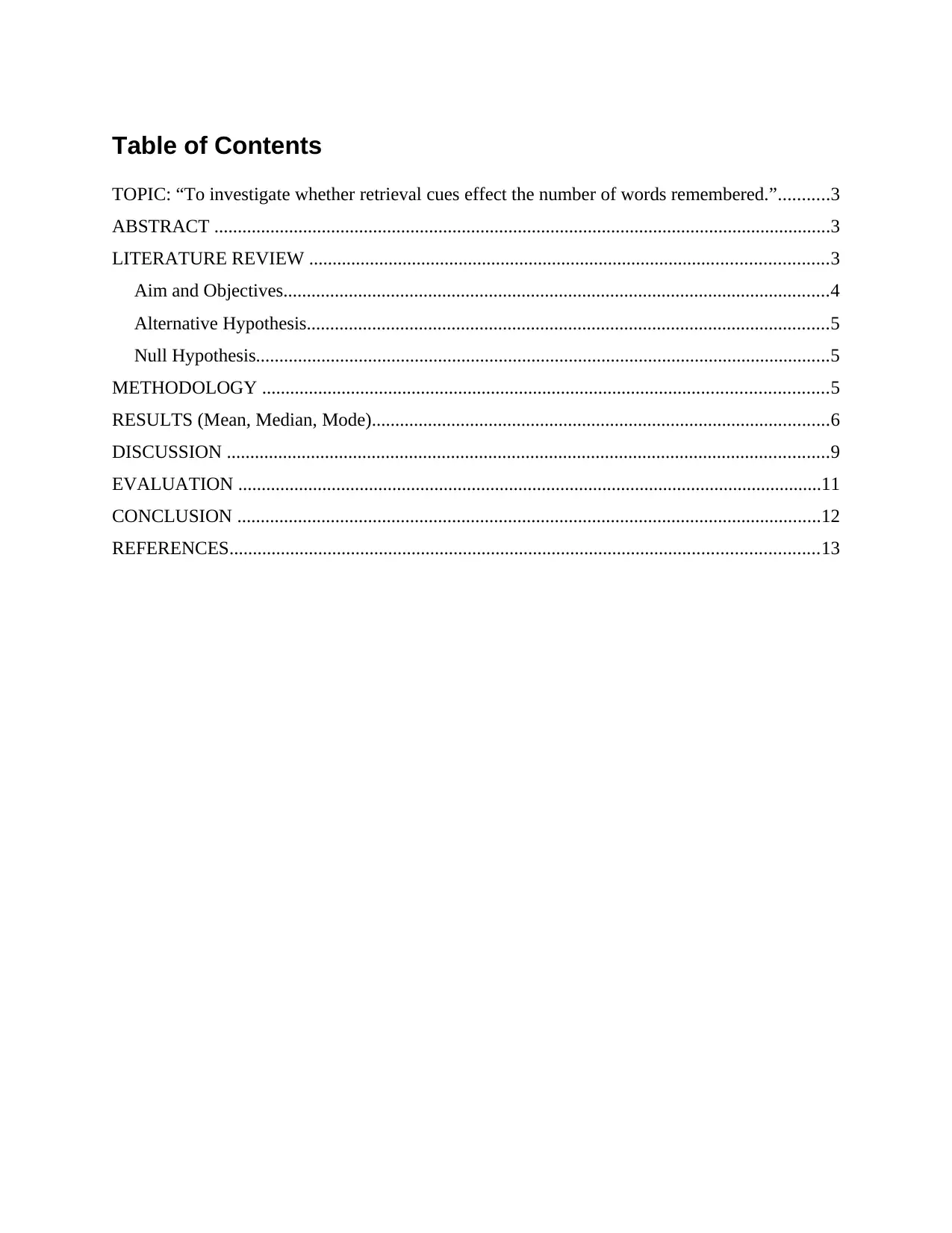
Table of Contents
TOPIC: “To investigate whether retrieval cues effect the number of words remembered.”...........3
ABSTRACT ....................................................................................................................................3
LITERATURE REVIEW ...............................................................................................................3
Aim and Objectives.....................................................................................................................4
Alternative Hypothesis................................................................................................................5
Null Hypothesis...........................................................................................................................5
METHODOLOGY .........................................................................................................................5
RESULTS (Mean, Median, Mode)..................................................................................................6
DISCUSSION .................................................................................................................................9
EVALUATION .............................................................................................................................11
CONCLUSION .............................................................................................................................12
REFERENCES..............................................................................................................................13
TOPIC: “To investigate whether retrieval cues effect the number of words remembered.”...........3
ABSTRACT ....................................................................................................................................3
LITERATURE REVIEW ...............................................................................................................3
Aim and Objectives.....................................................................................................................4
Alternative Hypothesis................................................................................................................5
Null Hypothesis...........................................................................................................................5
METHODOLOGY .........................................................................................................................5
RESULTS (Mean, Median, Mode)..................................................................................................6
DISCUSSION .................................................................................................................................9
EVALUATION .............................................................................................................................11
CONCLUSION .............................................................................................................................12
REFERENCES..............................................................................................................................13
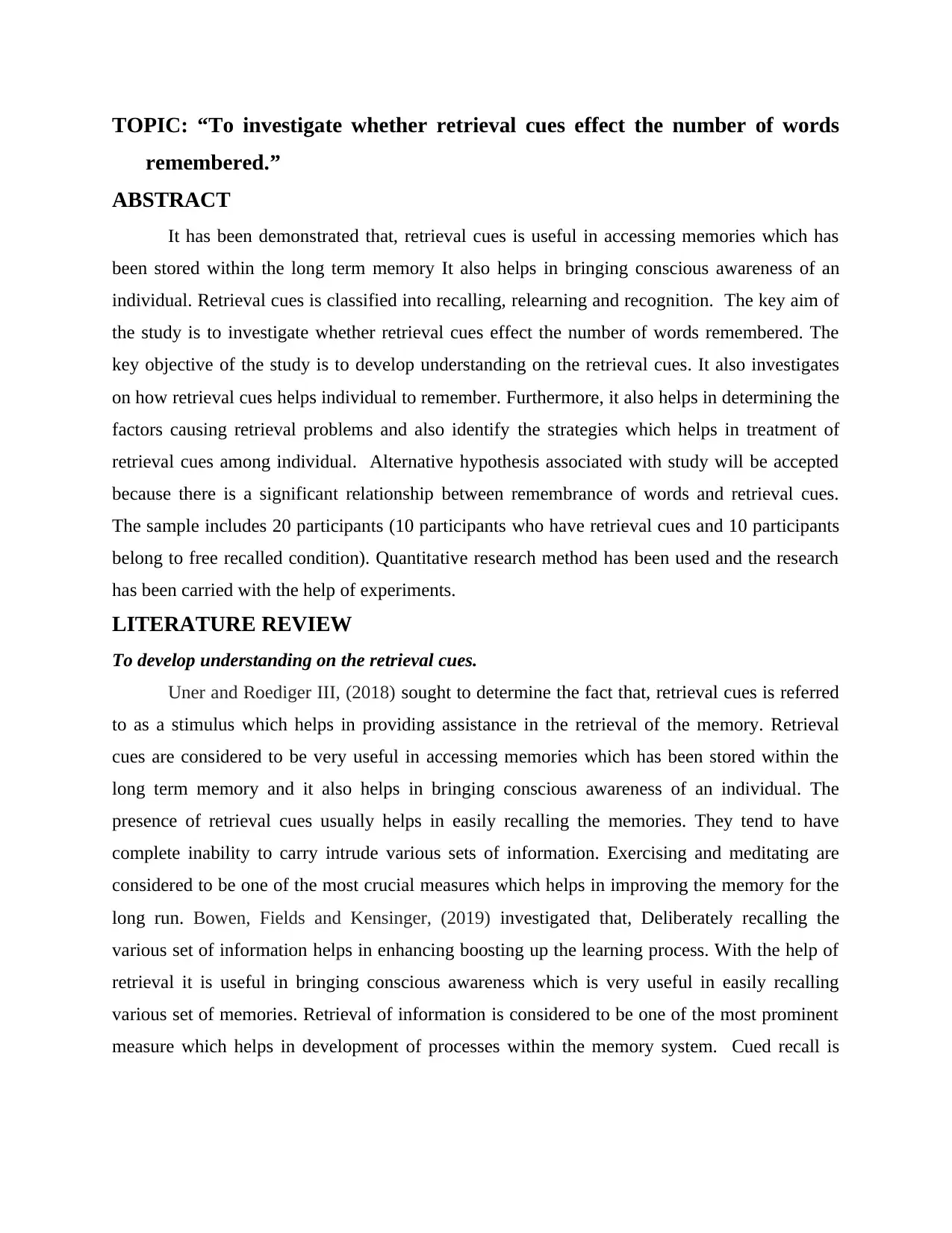
TOPIC: “To investigate whether retrieval cues effect the number of words
remembered.”
ABSTRACT
It has been demonstrated that, retrieval cues is useful in accessing memories which has
been stored within the long term memory It also helps in bringing conscious awareness of an
individual. Retrieval cues is classified into recalling, relearning and recognition. The key aim of
the study is to investigate whether retrieval cues effect the number of words remembered. The
key objective of the study is to develop understanding on the retrieval cues. It also investigates
on how retrieval cues helps individual to remember. Furthermore, it also helps in determining the
factors causing retrieval problems and also identify the strategies which helps in treatment of
retrieval cues among individual. Alternative hypothesis associated with study will be accepted
because there is a significant relationship between remembrance of words and retrieval cues.
The sample includes 20 participants (10 participants who have retrieval cues and 10 participants
belong to free recalled condition). Quantitative research method has been used and the research
has been carried with the help of experiments.
LITERATURE REVIEW
To develop understanding on the retrieval cues.
Uner and Roediger III, (2018) sought to determine the fact that, retrieval cues is referred
to as a stimulus which helps in providing assistance in the retrieval of the memory. Retrieval
cues are considered to be very useful in accessing memories which has been stored within the
long term memory and it also helps in bringing conscious awareness of an individual. The
presence of retrieval cues usually helps in easily recalling the memories. They tend to have
complete inability to carry intrude various sets of information. Exercising and meditating are
considered to be one of the most crucial measures which helps in improving the memory for the
long run. Bowen, Fields and Kensinger, (2019) investigated that, Deliberately recalling the
various set of information helps in enhancing boosting up the learning process. With the help of
retrieval it is useful in bringing conscious awareness which is very useful in easily recalling
various set of memories. Retrieval of information is considered to be one of the most prominent
measure which helps in development of processes within the memory system. Cued recall is
remembered.”
ABSTRACT
It has been demonstrated that, retrieval cues is useful in accessing memories which has
been stored within the long term memory It also helps in bringing conscious awareness of an
individual. Retrieval cues is classified into recalling, relearning and recognition. The key aim of
the study is to investigate whether retrieval cues effect the number of words remembered. The
key objective of the study is to develop understanding on the retrieval cues. It also investigates
on how retrieval cues helps individual to remember. Furthermore, it also helps in determining the
factors causing retrieval problems and also identify the strategies which helps in treatment of
retrieval cues among individual. Alternative hypothesis associated with study will be accepted
because there is a significant relationship between remembrance of words and retrieval cues.
The sample includes 20 participants (10 participants who have retrieval cues and 10 participants
belong to free recalled condition). Quantitative research method has been used and the research
has been carried with the help of experiments.
LITERATURE REVIEW
To develop understanding on the retrieval cues.
Uner and Roediger III, (2018) sought to determine the fact that, retrieval cues is referred
to as a stimulus which helps in providing assistance in the retrieval of the memory. Retrieval
cues are considered to be very useful in accessing memories which has been stored within the
long term memory and it also helps in bringing conscious awareness of an individual. The
presence of retrieval cues usually helps in easily recalling the memories. They tend to have
complete inability to carry intrude various sets of information. Exercising and meditating are
considered to be one of the most crucial measures which helps in improving the memory for the
long run. Bowen, Fields and Kensinger, (2019) investigated that, Deliberately recalling the
various set of information helps in enhancing boosting up the learning process. With the help of
retrieval it is useful in bringing conscious awareness which is very useful in easily recalling
various set of memories. Retrieval of information is considered to be one of the most prominent
measure which helps in development of processes within the memory system. Cued recall is
⊘ This is a preview!⊘
Do you want full access?
Subscribe today to unlock all pages.

Trusted by 1+ million students worldwide
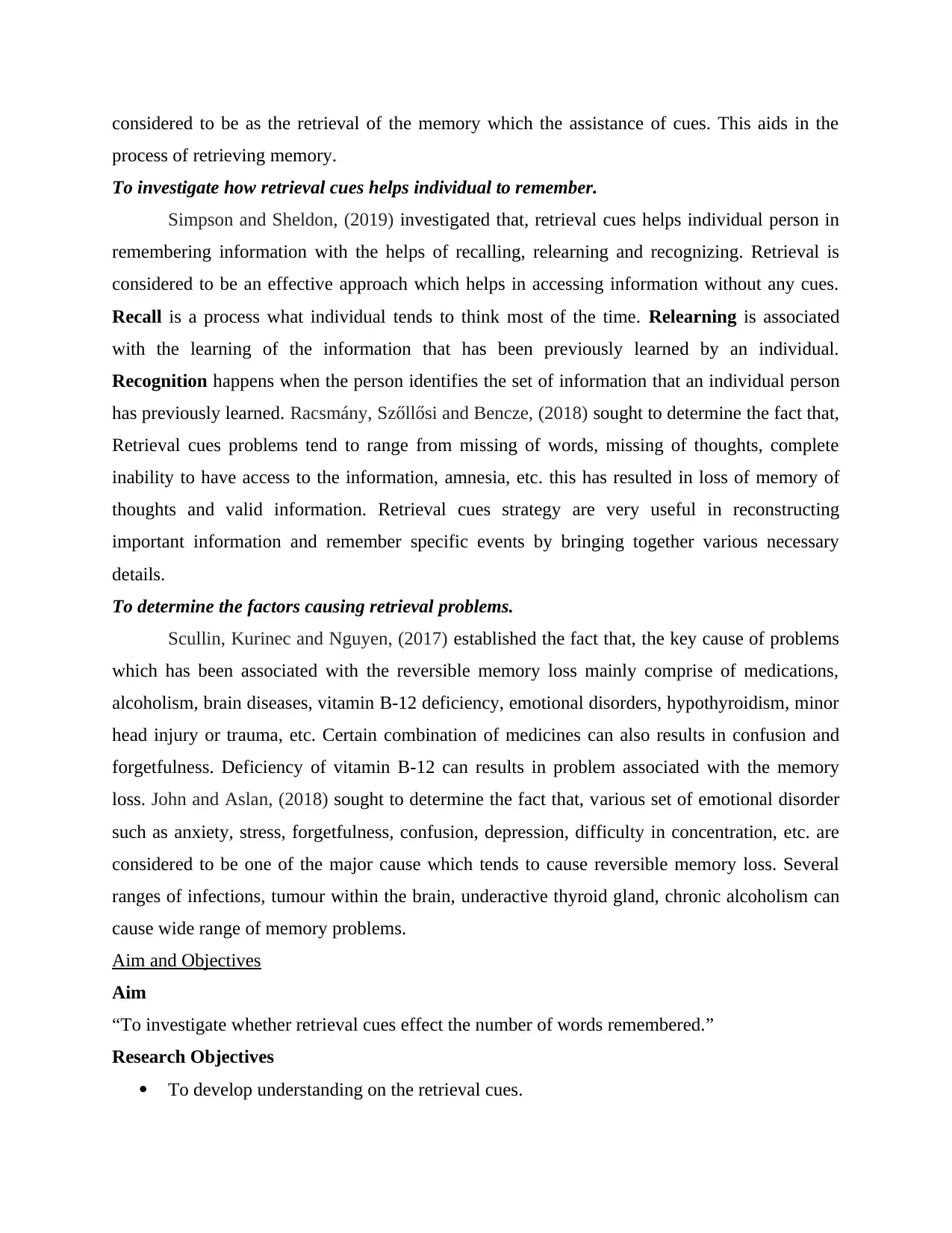
considered to be as the retrieval of the memory which the assistance of cues. This aids in the
process of retrieving memory.
To investigate how retrieval cues helps individual to remember.
Simpson and Sheldon, (2019) investigated that, retrieval cues helps individual person in
remembering information with the helps of recalling, relearning and recognizing. Retrieval is
considered to be an effective approach which helps in accessing information without any cues.
Recall is a process what individual tends to think most of the time. Relearning is associated
with the learning of the information that has been previously learned by an individual.
Recognition happens when the person identifies the set of information that an individual person
has previously learned. Racsmány, Szőllősi and Bencze, (2018) sought to determine the fact that,
Retrieval cues problems tend to range from missing of words, missing of thoughts, complete
inability to have access to the information, amnesia, etc. this has resulted in loss of memory of
thoughts and valid information. Retrieval cues strategy are very useful in reconstructing
important information and remember specific events by bringing together various necessary
details.
To determine the factors causing retrieval problems.
Scullin, Kurinec and Nguyen, (2017) established the fact that, the key cause of problems
which has been associated with the reversible memory loss mainly comprise of medications,
alcoholism, brain diseases, vitamin B-12 deficiency, emotional disorders, hypothyroidism, minor
head injury or trauma, etc. Certain combination of medicines can also results in confusion and
forgetfulness. Deficiency of vitamin B-12 can results in problem associated with the memory
loss. John and Aslan, (2018) sought to determine the fact that, various set of emotional disorder
such as anxiety, stress, forgetfulness, confusion, depression, difficulty in concentration, etc. are
considered to be one of the major cause which tends to cause reversible memory loss. Several
ranges of infections, tumour within the brain, underactive thyroid gland, chronic alcoholism can
cause wide range of memory problems.
Aim and Objectives
Aim
“To investigate whether retrieval cues effect the number of words remembered.”
Research Objectives
To develop understanding on the retrieval cues.
process of retrieving memory.
To investigate how retrieval cues helps individual to remember.
Simpson and Sheldon, (2019) investigated that, retrieval cues helps individual person in
remembering information with the helps of recalling, relearning and recognizing. Retrieval is
considered to be an effective approach which helps in accessing information without any cues.
Recall is a process what individual tends to think most of the time. Relearning is associated
with the learning of the information that has been previously learned by an individual.
Recognition happens when the person identifies the set of information that an individual person
has previously learned. Racsmány, Szőllősi and Bencze, (2018) sought to determine the fact that,
Retrieval cues problems tend to range from missing of words, missing of thoughts, complete
inability to have access to the information, amnesia, etc. this has resulted in loss of memory of
thoughts and valid information. Retrieval cues strategy are very useful in reconstructing
important information and remember specific events by bringing together various necessary
details.
To determine the factors causing retrieval problems.
Scullin, Kurinec and Nguyen, (2017) established the fact that, the key cause of problems
which has been associated with the reversible memory loss mainly comprise of medications,
alcoholism, brain diseases, vitamin B-12 deficiency, emotional disorders, hypothyroidism, minor
head injury or trauma, etc. Certain combination of medicines can also results in confusion and
forgetfulness. Deficiency of vitamin B-12 can results in problem associated with the memory
loss. John and Aslan, (2018) sought to determine the fact that, various set of emotional disorder
such as anxiety, stress, forgetfulness, confusion, depression, difficulty in concentration, etc. are
considered to be one of the major cause which tends to cause reversible memory loss. Several
ranges of infections, tumour within the brain, underactive thyroid gland, chronic alcoholism can
cause wide range of memory problems.
Aim and Objectives
Aim
“To investigate whether retrieval cues effect the number of words remembered.”
Research Objectives
To develop understanding on the retrieval cues.
Paraphrase This Document
Need a fresh take? Get an instant paraphrase of this document with our AI Paraphraser
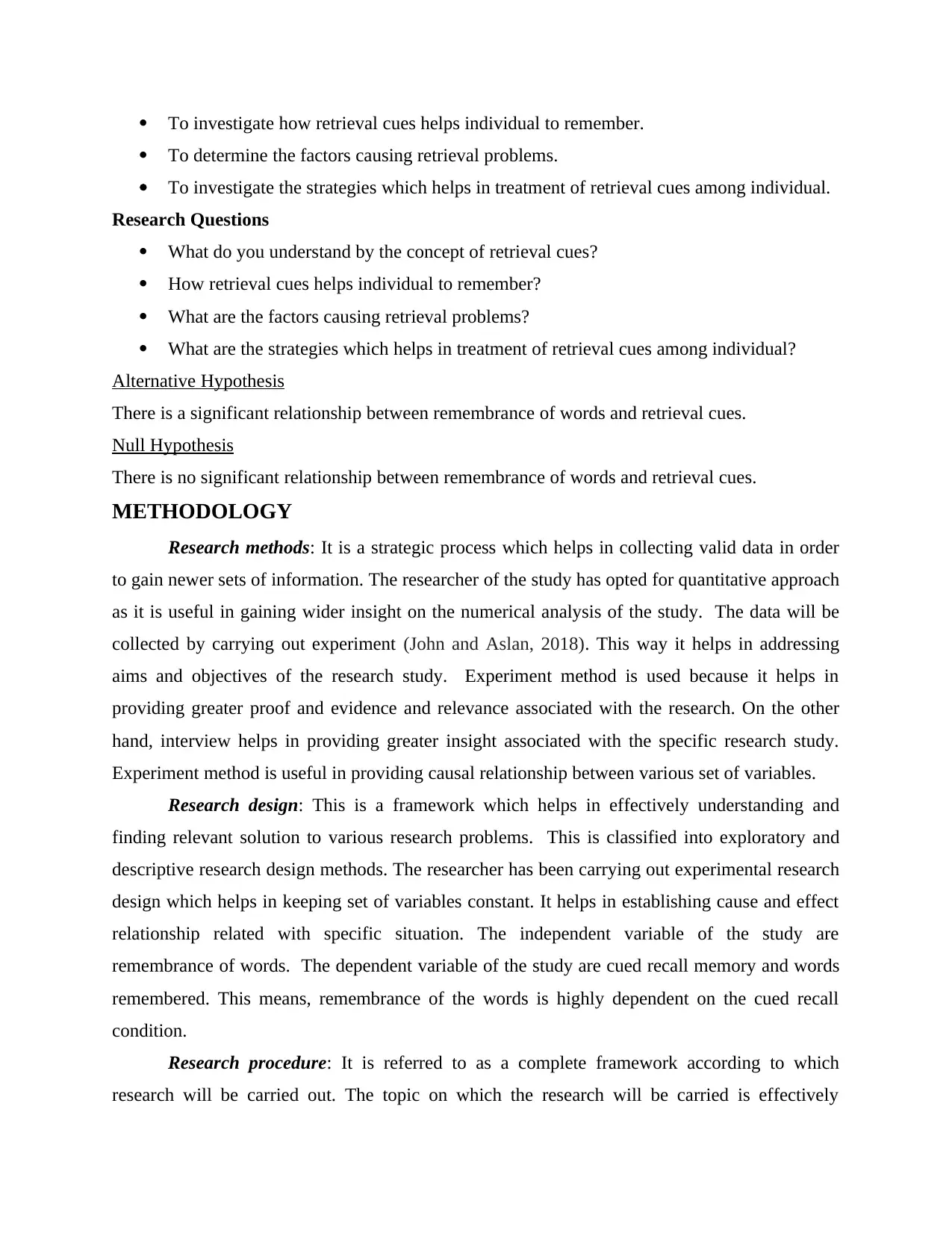
To investigate how retrieval cues helps individual to remember.
To determine the factors causing retrieval problems.
To investigate the strategies which helps in treatment of retrieval cues among individual.
Research Questions
What do you understand by the concept of retrieval cues?
How retrieval cues helps individual to remember?
What are the factors causing retrieval problems?
What are the strategies which helps in treatment of retrieval cues among individual?
Alternative Hypothesis
There is a significant relationship between remembrance of words and retrieval cues.
Null Hypothesis
There is no significant relationship between remembrance of words and retrieval cues.
METHODOLOGY
Research methods: It is a strategic process which helps in collecting valid data in order
to gain newer sets of information. The researcher of the study has opted for quantitative approach
as it is useful in gaining wider insight on the numerical analysis of the study. The data will be
collected by carrying out experiment (John and Aslan, 2018). This way it helps in addressing
aims and objectives of the research study. Experiment method is used because it helps in
providing greater proof and evidence and relevance associated with the research. On the other
hand, interview helps in providing greater insight associated with the specific research study.
Experiment method is useful in providing causal relationship between various set of variables.
Research design: This is a framework which helps in effectively understanding and
finding relevant solution to various research problems. This is classified into exploratory and
descriptive research design methods. The researcher has been carrying out experimental research
design which helps in keeping set of variables constant. It helps in establishing cause and effect
relationship related with specific situation. The independent variable of the study are
remembrance of words. The dependent variable of the study are cued recall memory and words
remembered. This means, remembrance of the words is highly dependent on the cued recall
condition.
Research procedure: It is referred to as a complete framework according to which
research will be carried out. The topic on which the research will be carried is effectively
To determine the factors causing retrieval problems.
To investigate the strategies which helps in treatment of retrieval cues among individual.
Research Questions
What do you understand by the concept of retrieval cues?
How retrieval cues helps individual to remember?
What are the factors causing retrieval problems?
What are the strategies which helps in treatment of retrieval cues among individual?
Alternative Hypothesis
There is a significant relationship between remembrance of words and retrieval cues.
Null Hypothesis
There is no significant relationship between remembrance of words and retrieval cues.
METHODOLOGY
Research methods: It is a strategic process which helps in collecting valid data in order
to gain newer sets of information. The researcher of the study has opted for quantitative approach
as it is useful in gaining wider insight on the numerical analysis of the study. The data will be
collected by carrying out experiment (John and Aslan, 2018). This way it helps in addressing
aims and objectives of the research study. Experiment method is used because it helps in
providing greater proof and evidence and relevance associated with the research. On the other
hand, interview helps in providing greater insight associated with the specific research study.
Experiment method is useful in providing causal relationship between various set of variables.
Research design: This is a framework which helps in effectively understanding and
finding relevant solution to various research problems. This is classified into exploratory and
descriptive research design methods. The researcher has been carrying out experimental research
design which helps in keeping set of variables constant. It helps in establishing cause and effect
relationship related with specific situation. The independent variable of the study are
remembrance of words. The dependent variable of the study are cued recall memory and words
remembered. This means, remembrance of the words is highly dependent on the cued recall
condition.
Research procedure: It is referred to as a complete framework according to which
research will be carried out. The topic on which the research will be carried is effectively
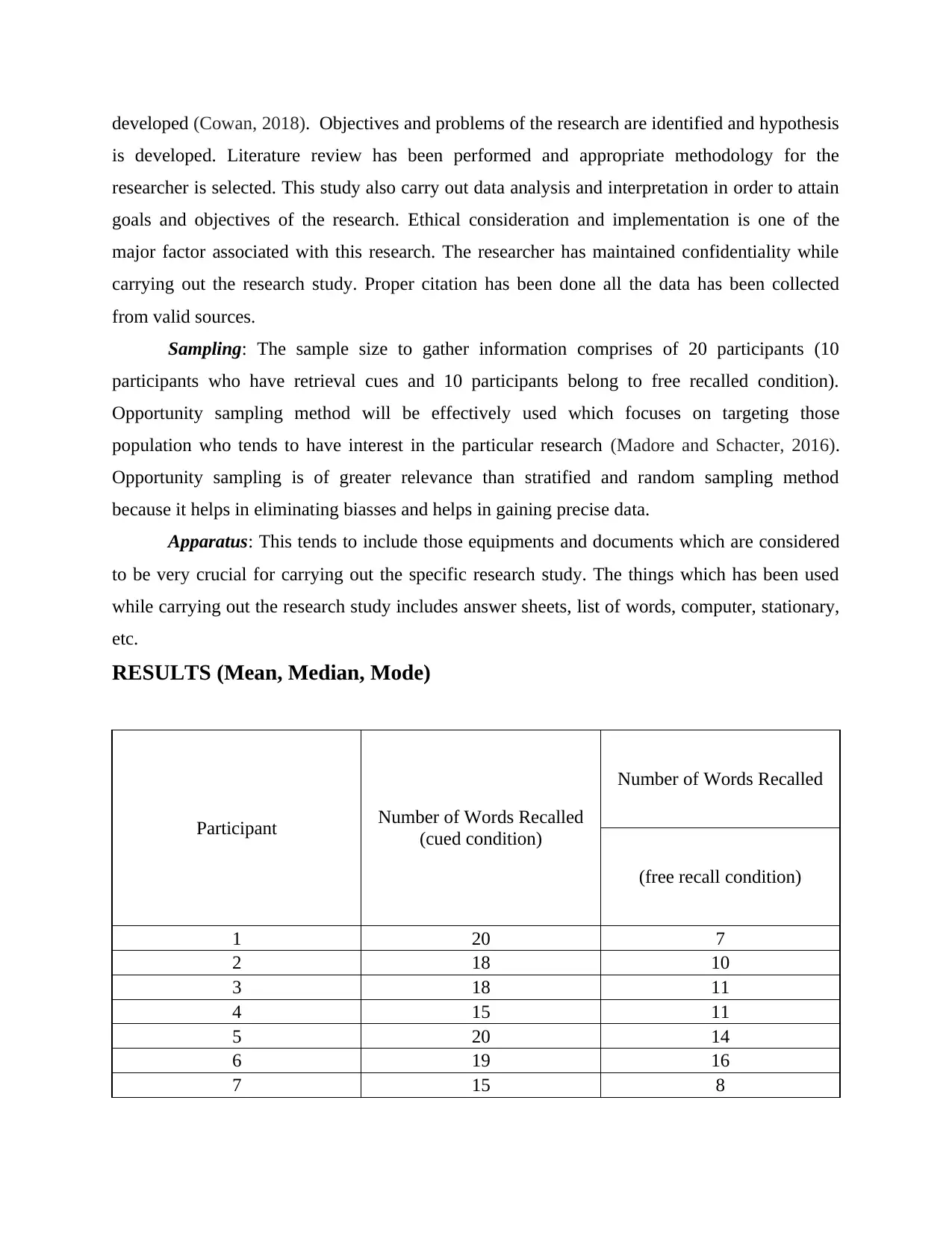
developed (Cowan, 2018). Objectives and problems of the research are identified and hypothesis
is developed. Literature review has been performed and appropriate methodology for the
researcher is selected. This study also carry out data analysis and interpretation in order to attain
goals and objectives of the research. Ethical consideration and implementation is one of the
major factor associated with this research. The researcher has maintained confidentiality while
carrying out the research study. Proper citation has been done all the data has been collected
from valid sources.
Sampling: The sample size to gather information comprises of 20 participants (10
participants who have retrieval cues and 10 participants belong to free recalled condition).
Opportunity sampling method will be effectively used which focuses on targeting those
population who tends to have interest in the particular research (Madore and Schacter, 2016).
Opportunity sampling is of greater relevance than stratified and random sampling method
because it helps in eliminating biasses and helps in gaining precise data.
Apparatus: This tends to include those equipments and documents which are considered
to be very crucial for carrying out the specific research study. The things which has been used
while carrying out the research study includes answer sheets, list of words, computer, stationary,
etc.
RESULTS (Mean, Median, Mode)
Participant Number of Words Recalled
(cued condition)
Number of Words Recalled
(free recall condition)
1 20 7
2 18 10
3 18 11
4 15 11
5 20 14
6 19 16
7 15 8
is developed. Literature review has been performed and appropriate methodology for the
researcher is selected. This study also carry out data analysis and interpretation in order to attain
goals and objectives of the research. Ethical consideration and implementation is one of the
major factor associated with this research. The researcher has maintained confidentiality while
carrying out the research study. Proper citation has been done all the data has been collected
from valid sources.
Sampling: The sample size to gather information comprises of 20 participants (10
participants who have retrieval cues and 10 participants belong to free recalled condition).
Opportunity sampling method will be effectively used which focuses on targeting those
population who tends to have interest in the particular research (Madore and Schacter, 2016).
Opportunity sampling is of greater relevance than stratified and random sampling method
because it helps in eliminating biasses and helps in gaining precise data.
Apparatus: This tends to include those equipments and documents which are considered
to be very crucial for carrying out the specific research study. The things which has been used
while carrying out the research study includes answer sheets, list of words, computer, stationary,
etc.
RESULTS (Mean, Median, Mode)
Participant Number of Words Recalled
(cued condition)
Number of Words Recalled
(free recall condition)
1 20 7
2 18 10
3 18 11
4 15 11
5 20 14
6 19 16
7 15 8
⊘ This is a preview!⊘
Do you want full access?
Subscribe today to unlock all pages.

Trusted by 1+ million students worldwide
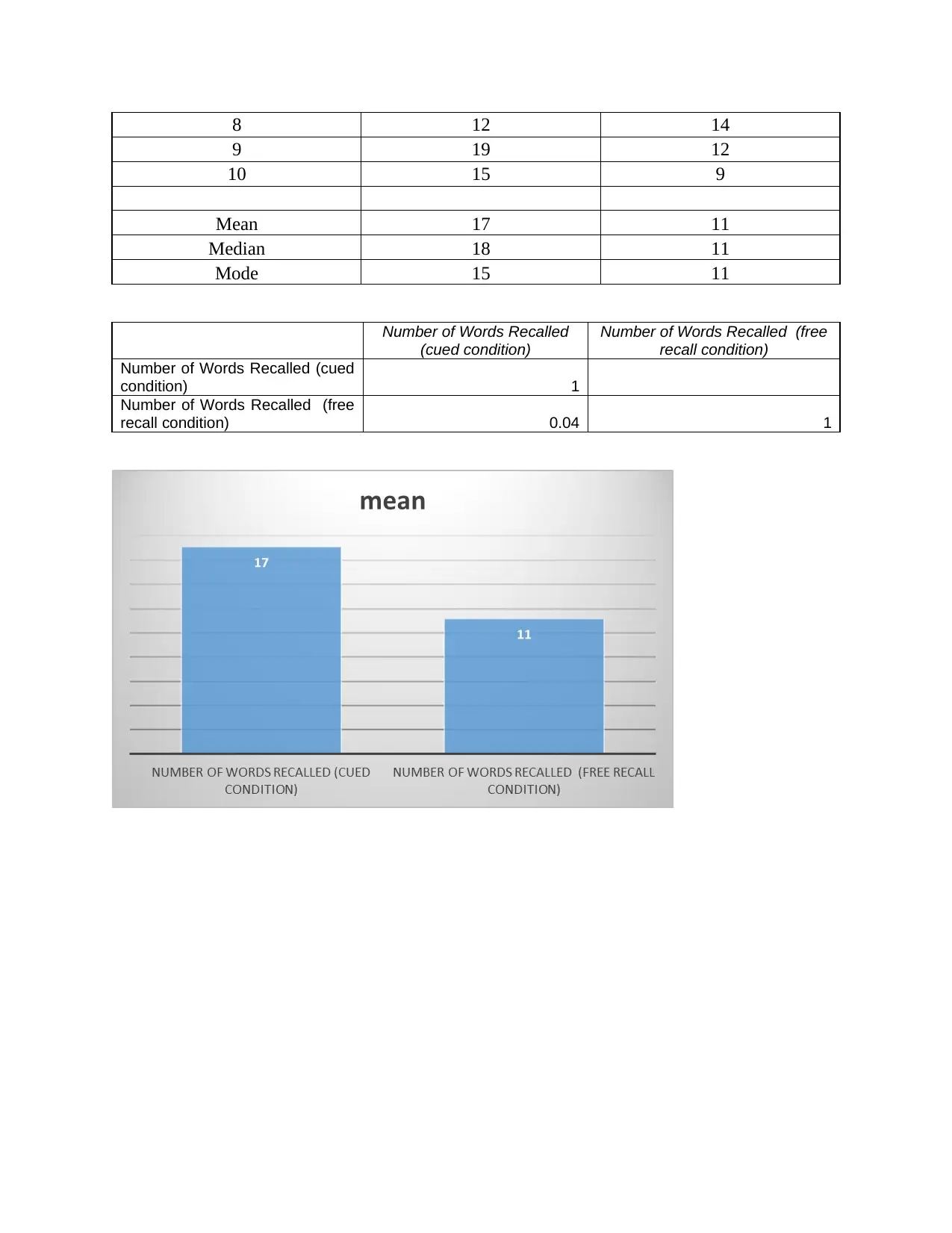
8 12 14
9 19 12
10 15 9
Mean 17 11
Median 18 11
Mode 15 11
Number of Words Recalled
(cued condition)
Number of Words Recalled (free
recall condition)
Number of Words Recalled (cued
condition) 1
Number of Words Recalled (free
recall condition) 0.04 1
9 19 12
10 15 9
Mean 17 11
Median 18 11
Mode 15 11
Number of Words Recalled
(cued condition)
Number of Words Recalled (free
recall condition)
Number of Words Recalled (cued
condition) 1
Number of Words Recalled (free
recall condition) 0.04 1
Paraphrase This Document
Need a fresh take? Get an instant paraphrase of this document with our AI Paraphraser
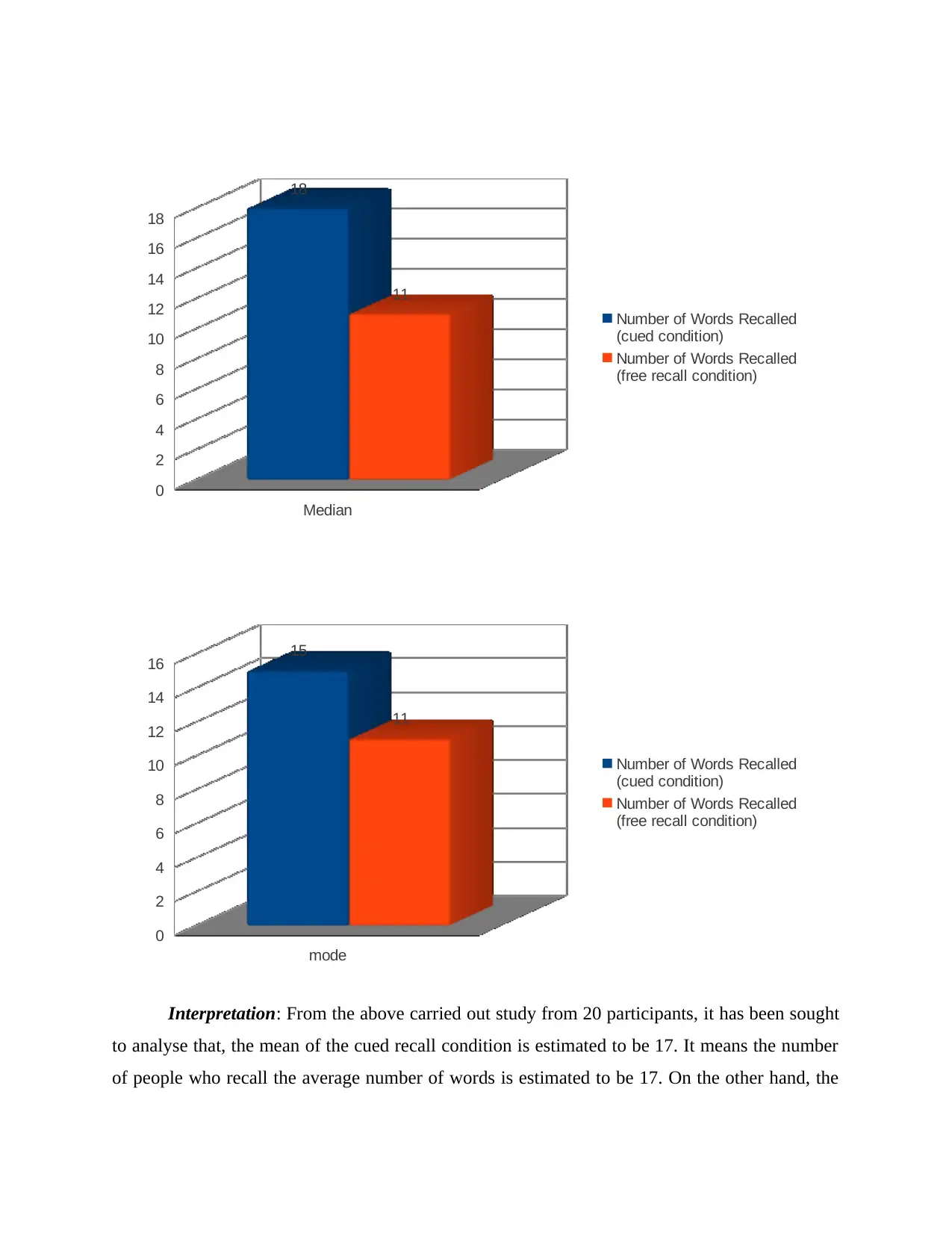
Median
0
2
4
6
8
10
12
14
16
18
18
11
Number of Words Recalled
(cued condition)
Number of Words Recalled
(free recall condition)
mode
0
2
4
6
8
10
12
14
16 15
11
Number of Words Recalled
(cued condition)
Number of Words Recalled
(free recall condition)
Interpretation: From the above carried out study from 20 participants, it has been sought
to analyse that, the mean of the cued recall condition is estimated to be 17. It means the number
of people who recall the average number of words is estimated to be 17. On the other hand, the
0
2
4
6
8
10
12
14
16
18
18
11
Number of Words Recalled
(cued condition)
Number of Words Recalled
(free recall condition)
mode
0
2
4
6
8
10
12
14
16 15
11
Number of Words Recalled
(cued condition)
Number of Words Recalled
(free recall condition)
Interpretation: From the above carried out study from 20 participants, it has been sought
to analyse that, the mean of the cued recall condition is estimated to be 17. It means the number
of people who recall the average number of words is estimated to be 17. On the other hand, the
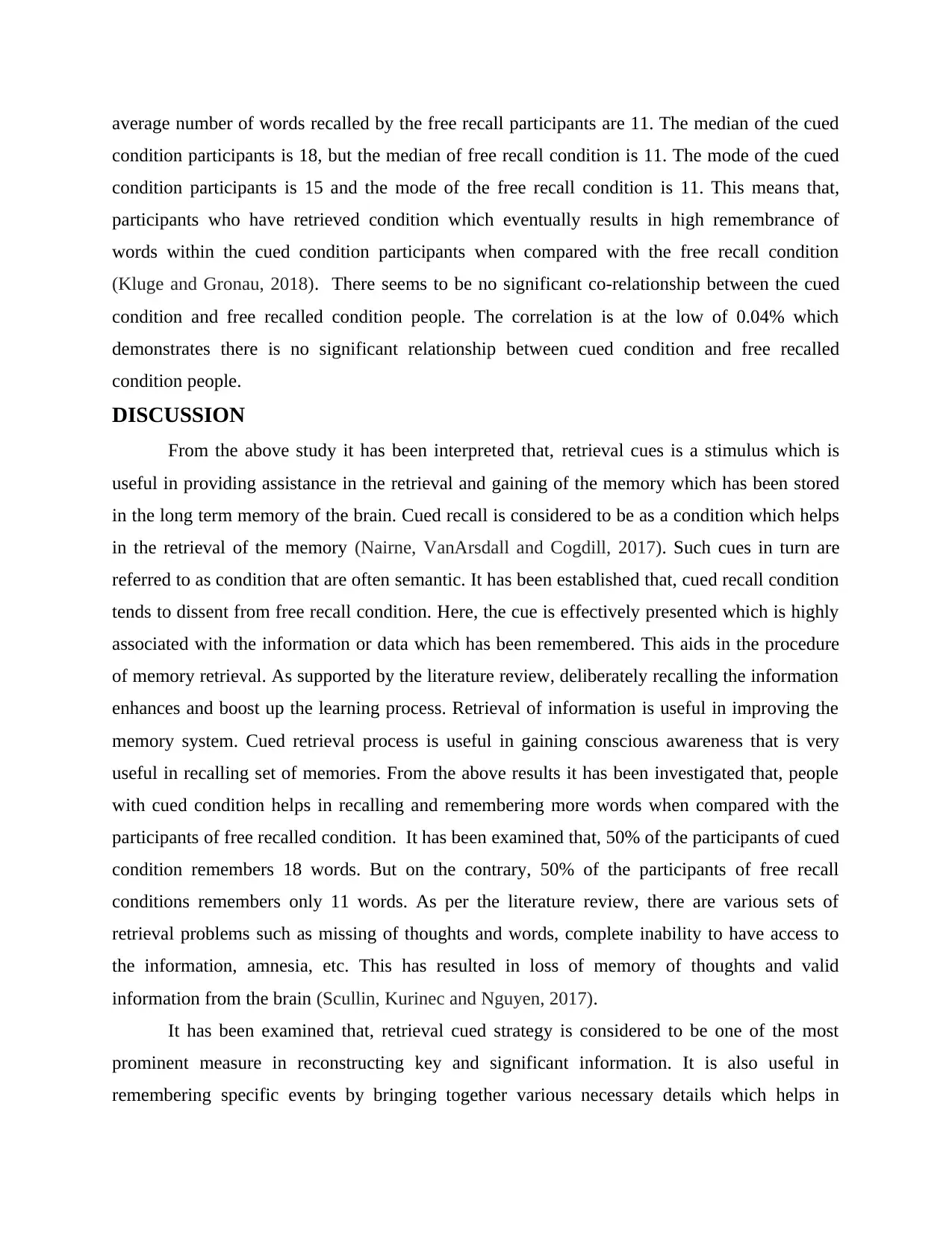
average number of words recalled by the free recall participants are 11. The median of the cued
condition participants is 18, but the median of free recall condition is 11. The mode of the cued
condition participants is 15 and the mode of the free recall condition is 11. This means that,
participants who have retrieved condition which eventually results in high remembrance of
words within the cued condition participants when compared with the free recall condition
(Kluge and Gronau, 2018). There seems to be no significant co-relationship between the cued
condition and free recalled condition people. The correlation is at the low of 0.04% which
demonstrates there is no significant relationship between cued condition and free recalled
condition people.
DISCUSSION
From the above study it has been interpreted that, retrieval cues is a stimulus which is
useful in providing assistance in the retrieval and gaining of the memory which has been stored
in the long term memory of the brain. Cued recall is considered to be as a condition which helps
in the retrieval of the memory (Nairne, VanArsdall and Cogdill, 2017). Such cues in turn are
referred to as condition that are often semantic. It has been established that, cued recall condition
tends to dissent from free recall condition. Here, the cue is effectively presented which is highly
associated with the information or data which has been remembered. This aids in the procedure
of memory retrieval. As supported by the literature review, deliberately recalling the information
enhances and boost up the learning process. Retrieval of information is useful in improving the
memory system. Cued retrieval process is useful in gaining conscious awareness that is very
useful in recalling set of memories. From the above results it has been investigated that, people
with cued condition helps in recalling and remembering more words when compared with the
participants of free recalled condition. It has been examined that, 50% of the participants of cued
condition remembers 18 words. But on the contrary, 50% of the participants of free recall
conditions remembers only 11 words. As per the literature review, there are various sets of
retrieval problems such as missing of thoughts and words, complete inability to have access to
the information, amnesia, etc. This has resulted in loss of memory of thoughts and valid
information from the brain (Scullin, Kurinec and Nguyen, 2017).
It has been examined that, retrieval cued strategy is considered to be one of the most
prominent measure in reconstructing key and significant information. It is also useful in
remembering specific events by bringing together various necessary details which helps in
condition participants is 18, but the median of free recall condition is 11. The mode of the cued
condition participants is 15 and the mode of the free recall condition is 11. This means that,
participants who have retrieved condition which eventually results in high remembrance of
words within the cued condition participants when compared with the free recall condition
(Kluge and Gronau, 2018). There seems to be no significant co-relationship between the cued
condition and free recalled condition people. The correlation is at the low of 0.04% which
demonstrates there is no significant relationship between cued condition and free recalled
condition people.
DISCUSSION
From the above study it has been interpreted that, retrieval cues is a stimulus which is
useful in providing assistance in the retrieval and gaining of the memory which has been stored
in the long term memory of the brain. Cued recall is considered to be as a condition which helps
in the retrieval of the memory (Nairne, VanArsdall and Cogdill, 2017). Such cues in turn are
referred to as condition that are often semantic. It has been established that, cued recall condition
tends to dissent from free recall condition. Here, the cue is effectively presented which is highly
associated with the information or data which has been remembered. This aids in the procedure
of memory retrieval. As supported by the literature review, deliberately recalling the information
enhances and boost up the learning process. Retrieval of information is useful in improving the
memory system. Cued retrieval process is useful in gaining conscious awareness that is very
useful in recalling set of memories. From the above results it has been investigated that, people
with cued condition helps in recalling and remembering more words when compared with the
participants of free recalled condition. It has been examined that, 50% of the participants of cued
condition remembers 18 words. But on the contrary, 50% of the participants of free recall
conditions remembers only 11 words. As per the literature review, there are various sets of
retrieval problems such as missing of thoughts and words, complete inability to have access to
the information, amnesia, etc. This has resulted in loss of memory of thoughts and valid
information from the brain (Scullin, Kurinec and Nguyen, 2017).
It has been examined that, retrieval cued strategy is considered to be one of the most
prominent measure in reconstructing key and significant information. It is also useful in
remembering specific events by bringing together various necessary details which helps in
⊘ This is a preview!⊘
Do you want full access?
Subscribe today to unlock all pages.

Trusted by 1+ million students worldwide
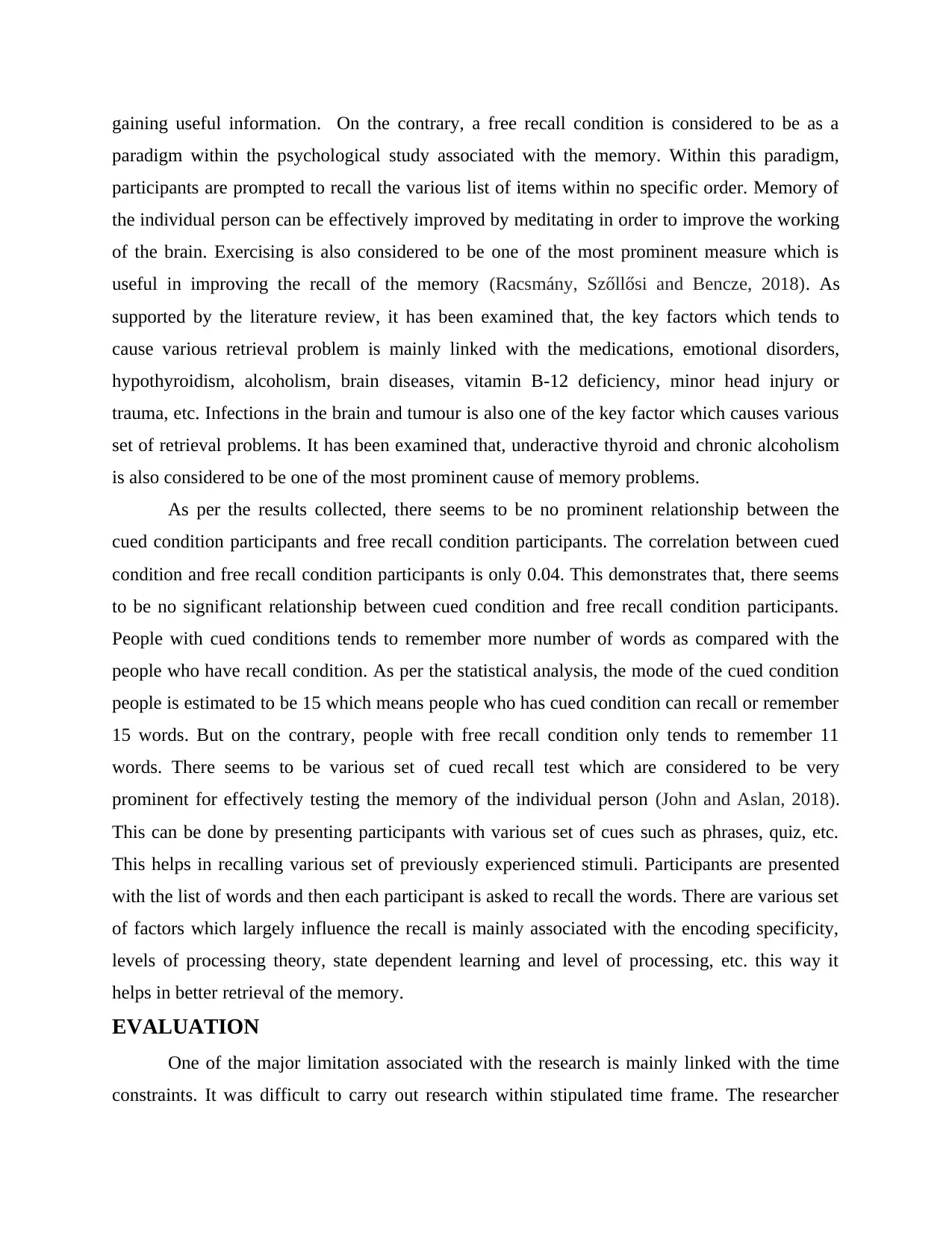
gaining useful information. On the contrary, a free recall condition is considered to be as a
paradigm within the psychological study associated with the memory. Within this paradigm,
participants are prompted to recall the various list of items within no specific order. Memory of
the individual person can be effectively improved by meditating in order to improve the working
of the brain. Exercising is also considered to be one of the most prominent measure which is
useful in improving the recall of the memory (Racsmány, Szőllősi and Bencze, 2018). As
supported by the literature review, it has been examined that, the key factors which tends to
cause various retrieval problem is mainly linked with the medications, emotional disorders,
hypothyroidism, alcoholism, brain diseases, vitamin B-12 deficiency, minor head injury or
trauma, etc. Infections in the brain and tumour is also one of the key factor which causes various
set of retrieval problems. It has been examined that, underactive thyroid and chronic alcoholism
is also considered to be one of the most prominent cause of memory problems.
As per the results collected, there seems to be no prominent relationship between the
cued condition participants and free recall condition participants. The correlation between cued
condition and free recall condition participants is only 0.04. This demonstrates that, there seems
to be no significant relationship between cued condition and free recall condition participants.
People with cued conditions tends to remember more number of words as compared with the
people who have recall condition. As per the statistical analysis, the mode of the cued condition
people is estimated to be 15 which means people who has cued condition can recall or remember
15 words. But on the contrary, people with free recall condition only tends to remember 11
words. There seems to be various set of cued recall test which are considered to be very
prominent for effectively testing the memory of the individual person (John and Aslan, 2018).
This can be done by presenting participants with various set of cues such as phrases, quiz, etc.
This helps in recalling various set of previously experienced stimuli. Participants are presented
with the list of words and then each participant is asked to recall the words. There are various set
of factors which largely influence the recall is mainly associated with the encoding specificity,
levels of processing theory, state dependent learning and level of processing, etc. this way it
helps in better retrieval of the memory.
EVALUATION
One of the major limitation associated with the research is mainly linked with the time
constraints. It was difficult to carry out research within stipulated time frame. The researcher
paradigm within the psychological study associated with the memory. Within this paradigm,
participants are prompted to recall the various list of items within no specific order. Memory of
the individual person can be effectively improved by meditating in order to improve the working
of the brain. Exercising is also considered to be one of the most prominent measure which is
useful in improving the recall of the memory (Racsmány, Szőllősi and Bencze, 2018). As
supported by the literature review, it has been examined that, the key factors which tends to
cause various retrieval problem is mainly linked with the medications, emotional disorders,
hypothyroidism, alcoholism, brain diseases, vitamin B-12 deficiency, minor head injury or
trauma, etc. Infections in the brain and tumour is also one of the key factor which causes various
set of retrieval problems. It has been examined that, underactive thyroid and chronic alcoholism
is also considered to be one of the most prominent cause of memory problems.
As per the results collected, there seems to be no prominent relationship between the
cued condition participants and free recall condition participants. The correlation between cued
condition and free recall condition participants is only 0.04. This demonstrates that, there seems
to be no significant relationship between cued condition and free recall condition participants.
People with cued conditions tends to remember more number of words as compared with the
people who have recall condition. As per the statistical analysis, the mode of the cued condition
people is estimated to be 15 which means people who has cued condition can recall or remember
15 words. But on the contrary, people with free recall condition only tends to remember 11
words. There seems to be various set of cued recall test which are considered to be very
prominent for effectively testing the memory of the individual person (John and Aslan, 2018).
This can be done by presenting participants with various set of cues such as phrases, quiz, etc.
This helps in recalling various set of previously experienced stimuli. Participants are presented
with the list of words and then each participant is asked to recall the words. There are various set
of factors which largely influence the recall is mainly associated with the encoding specificity,
levels of processing theory, state dependent learning and level of processing, etc. this way it
helps in better retrieval of the memory.
EVALUATION
One of the major limitation associated with the research is mainly linked with the time
constraints. It was difficult to carry out research within stipulated time frame. The researcher
Paraphrase This Document
Need a fresh take? Get an instant paraphrase of this document with our AI Paraphraser
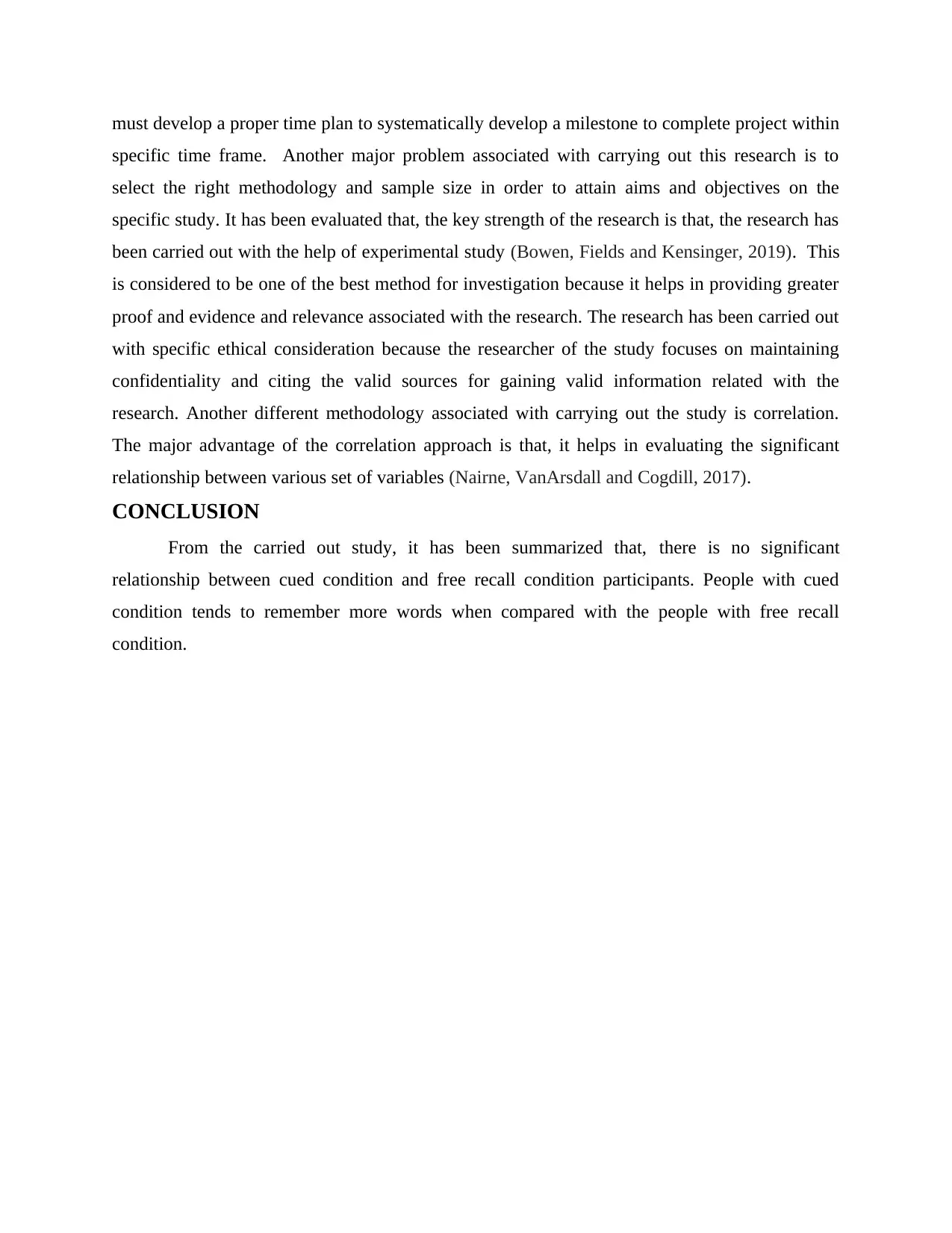
must develop a proper time plan to systematically develop a milestone to complete project within
specific time frame. Another major problem associated with carrying out this research is to
select the right methodology and sample size in order to attain aims and objectives on the
specific study. It has been evaluated that, the key strength of the research is that, the research has
been carried out with the help of experimental study (Bowen, Fields and Kensinger, 2019). This
is considered to be one of the best method for investigation because it helps in providing greater
proof and evidence and relevance associated with the research. The research has been carried out
with specific ethical consideration because the researcher of the study focuses on maintaining
confidentiality and citing the valid sources for gaining valid information related with the
research. Another different methodology associated with carrying out the study is correlation.
The major advantage of the correlation approach is that, it helps in evaluating the significant
relationship between various set of variables (Nairne, VanArsdall and Cogdill, 2017).
CONCLUSION
From the carried out study, it has been summarized that, there is no significant
relationship between cued condition and free recall condition participants. People with cued
condition tends to remember more words when compared with the people with free recall
condition.
specific time frame. Another major problem associated with carrying out this research is to
select the right methodology and sample size in order to attain aims and objectives on the
specific study. It has been evaluated that, the key strength of the research is that, the research has
been carried out with the help of experimental study (Bowen, Fields and Kensinger, 2019). This
is considered to be one of the best method for investigation because it helps in providing greater
proof and evidence and relevance associated with the research. The research has been carried out
with specific ethical consideration because the researcher of the study focuses on maintaining
confidentiality and citing the valid sources for gaining valid information related with the
research. Another different methodology associated with carrying out the study is correlation.
The major advantage of the correlation approach is that, it helps in evaluating the significant
relationship between various set of variables (Nairne, VanArsdall and Cogdill, 2017).
CONCLUSION
From the carried out study, it has been summarized that, there is no significant
relationship between cued condition and free recall condition participants. People with cued
condition tends to remember more words when compared with the people with free recall
condition.
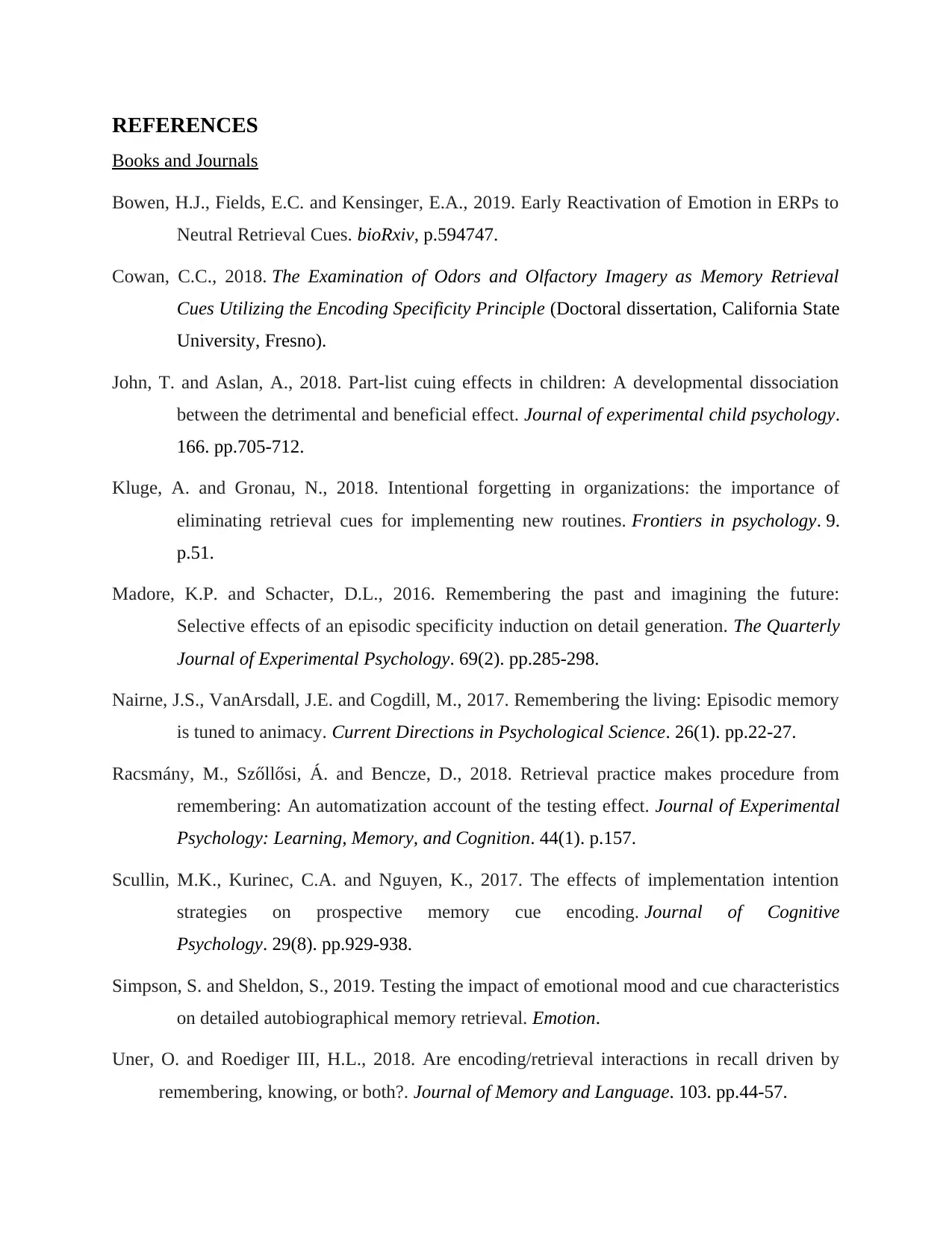
REFERENCES
Books and Journals
Bowen, H.J., Fields, E.C. and Kensinger, E.A., 2019. Early Reactivation of Emotion in ERPs to
Neutral Retrieval Cues. bioRxiv, p.594747.
Cowan, C.C., 2018. The Examination of Odors and Olfactory Imagery as Memory Retrieval
Cues Utilizing the Encoding Specificity Principle (Doctoral dissertation, California State
University, Fresno).
John, T. and Aslan, A., 2018. Part-list cuing effects in children: A developmental dissociation
between the detrimental and beneficial effect. Journal of experimental child psychology.
166. pp.705-712.
Kluge, A. and Gronau, N., 2018. Intentional forgetting in organizations: the importance of
eliminating retrieval cues for implementing new routines. Frontiers in psychology. 9.
p.51.
Madore, K.P. and Schacter, D.L., 2016. Remembering the past and imagining the future:
Selective effects of an episodic specificity induction on detail generation. The Quarterly
Journal of Experimental Psychology. 69(2). pp.285-298.
Nairne, J.S., VanArsdall, J.E. and Cogdill, M., 2017. Remembering the living: Episodic memory
is tuned to animacy. Current Directions in Psychological Science. 26(1). pp.22-27.
Racsmány, M., Szőllősi, Á. and Bencze, D., 2018. Retrieval practice makes procedure from
remembering: An automatization account of the testing effect. Journal of Experimental
Psychology: Learning, Memory, and Cognition. 44(1). p.157.
Scullin, M.K., Kurinec, C.A. and Nguyen, K., 2017. The effects of implementation intention
strategies on prospective memory cue encoding. Journal of Cognitive
Psychology. 29(8). pp.929-938.
Simpson, S. and Sheldon, S., 2019. Testing the impact of emotional mood and cue characteristics
on detailed autobiographical memory retrieval. Emotion.
Uner, O. and Roediger III, H.L., 2018. Are encoding/retrieval interactions in recall driven by
remembering, knowing, or both?. Journal of Memory and Language. 103. pp.44-57.
Books and Journals
Bowen, H.J., Fields, E.C. and Kensinger, E.A., 2019. Early Reactivation of Emotion in ERPs to
Neutral Retrieval Cues. bioRxiv, p.594747.
Cowan, C.C., 2018. The Examination of Odors and Olfactory Imagery as Memory Retrieval
Cues Utilizing the Encoding Specificity Principle (Doctoral dissertation, California State
University, Fresno).
John, T. and Aslan, A., 2018. Part-list cuing effects in children: A developmental dissociation
between the detrimental and beneficial effect. Journal of experimental child psychology.
166. pp.705-712.
Kluge, A. and Gronau, N., 2018. Intentional forgetting in organizations: the importance of
eliminating retrieval cues for implementing new routines. Frontiers in psychology. 9.
p.51.
Madore, K.P. and Schacter, D.L., 2016. Remembering the past and imagining the future:
Selective effects of an episodic specificity induction on detail generation. The Quarterly
Journal of Experimental Psychology. 69(2). pp.285-298.
Nairne, J.S., VanArsdall, J.E. and Cogdill, M., 2017. Remembering the living: Episodic memory
is tuned to animacy. Current Directions in Psychological Science. 26(1). pp.22-27.
Racsmány, M., Szőllősi, Á. and Bencze, D., 2018. Retrieval practice makes procedure from
remembering: An automatization account of the testing effect. Journal of Experimental
Psychology: Learning, Memory, and Cognition. 44(1). p.157.
Scullin, M.K., Kurinec, C.A. and Nguyen, K., 2017. The effects of implementation intention
strategies on prospective memory cue encoding. Journal of Cognitive
Psychology. 29(8). pp.929-938.
Simpson, S. and Sheldon, S., 2019. Testing the impact of emotional mood and cue characteristics
on detailed autobiographical memory retrieval. Emotion.
Uner, O. and Roediger III, H.L., 2018. Are encoding/retrieval interactions in recall driven by
remembering, knowing, or both?. Journal of Memory and Language. 103. pp.44-57.
⊘ This is a preview!⊘
Do you want full access?
Subscribe today to unlock all pages.

Trusted by 1+ million students worldwide
1 out of 12
Related Documents
Your All-in-One AI-Powered Toolkit for Academic Success.
+13062052269
info@desklib.com
Available 24*7 on WhatsApp / Email
![[object Object]](/_next/static/media/star-bottom.7253800d.svg)
Unlock your academic potential
Copyright © 2020–2025 A2Z Services. All Rights Reserved. Developed and managed by ZUCOL.





